QED (conference)
QED: Question, Explore, Discover, also called QEDcon or simply QED, is an annual skeptical conference held in Manchester, UK.[3][4] QED is organised by North West Skeptical Events Ltd (NWSE), a volunteer-owned non-profit organisation[5] originating from a collaboration between the Merseyside Skeptics Society and the Greater Manchester Skeptics Society.[6]
| QED: Question, Explore, Discover | |
|---|---|
 | |
| Status | Active |
| Genre | Science and skepticism[1] |
| Location(s) | Manchester, England |
| Country | United Kingdom |
| Inaugurated | 2011 |
| Attendance | 650 (2016)[2] |
| Organized by | North West Skeptical Events Ltd (collaboration between the Merseyside Skeptics Society and the Greater Manchester Skeptics Society) |
| Website | qedcon.org |
History
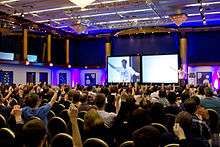
Starting in February 2011 the Merseyside Skeptics Society, in conjunction with the Greater Manchester Skeptics Society, began organising and presenting an annual two-day skeptical science festival, QED: Question, Explore, Discover.[8]
The master of ceremonies for the first QED was George Hrab. Notable speakers included Steven Novella and Eugenie Scott, and episodes of three podcasts, InKredulous, The Pod Delusion, and Strange Quarks, were recorded live during the event.[9] In an article about the first QED conference on the Committee for Skeptical Inquiry website, Kylie Sturgess said, "The organisers of QEDCon didn't need to proclaim the success of their convention from the stage — it was evident from the beginning to the end."[10] The conference was part of the 2011 10:23 Campaign, with The Challenge culminating in a homeopathic overdose on Belladonna by 350 participants of QED.[11][12]
By 2016, QED had grown out to 650 attendees,[2] with multiple simultaneous sessions in various formats, covering a wide range of topics "from ethics in magic to evolutionary biology to effective science communication and everything in between."[13] Incumbent ECSO President Claire Klingenberg[14] formerly described QED as "a very high-energy event", where "both the audience and the speakers are on average young and very active in their fields of interest." She said there were "so many brilliant people mulling around and simply not enough time to see and do everything, which makes you want to come back next year.".[13]
October 2018 QED event was the largest conference to date. The weekend was hosted by Helen Arney, along with speakers from around the world including; Steven Novella, Chris French and Michael Marshall, giving presentations on topics such as the fallacies of the wellness industry and the history of poltergeists. Alex Moshakis from The Observer, attending QED 2018, found the "underlining message related more to the skeptical process: how to become a more effective critical thinker".[15]
Setup
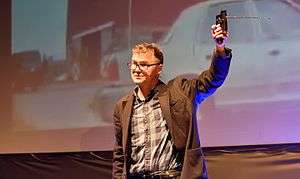
QED is organised by volunteers, and any proceeds go back into future events or to charities. In the first year, these charities were Sense About Science and the National Autistic Society.[8] On the Token Skeptic podcast, co-organiser Michael Marshall ("Marsh") commented:
How we try to always pitch it and how we try and run it is – it's all about the skeptical community. Because it's being run by people who are just part of that community who are doing this because we really love it, the atmosphere, seems to be, of people coming together. It's kind of a big party, a celebration of UK skepticism and also international skepticism.[17]
QED formally comprises two days, a Saturday and a Sunday. It is preceded by so-called "fringe events", with a Skeptics in the Pub event on Thursday night, a SkeptiCamp on Friday morning and afternoon, following by a pub quiz, and finally an informal socialising event known as the "QED Mixer".[2] The fringe events are free to attend and don't require a QED ticket.[18]
The general setup of the QED agenda is to have several main speakers who give lectures and workshops, live podcasts and panel discussions, alternated with in-depth sessions that most often run in parallel.[2][13] Some documentary films about scientific skepticism are screened, with Science Moms (2017) having had its world premiere at QED.[3] Many sessions are filmed, and can be viewed on YouTube afterwards.[19] On Saturday night, several social events are organised, such as a gala dinner, magic and comedy shows, and the Ockham Award ceremony.[2]
Events
| Event | Date | Venue | Notes |
|---|---|---|---|
| QED 2011 | 5–6 February 2011 | Mercure Piccadilly Hotel | Part of the 10:23 Campaign.[12] Speakers included Chris Atkins, Chris French, Wendy M. Grossman, George Hrab (emcee), Robin Ince, Ciarán O'Keeffe, Jim Al-Khalili, Steven Novella, Matt Parker, Jon Ronson, Eugenie Scott, Simon Singh, and Kylie Sturgess.[10] |
| QED 2012 | 10–11 March 2012 | Mercure Piccadilly Hotel | Sponsored by the Richard Dawkins Foundation for Reason and Science.[20] Speakers included David Aaronovitch, Ophelia Benson, Alun Cochrane, Edzard Ernst, D. J. Grothe, Deborah Hyde, Robin Ince, Maryam Namazie, Joe Nickell, Massimo Polidoro, Ian Ridpath, Richard Saunders, Richard Wiseman, and Paul Zenon. |
| QED 2013 | 13–14 April 2013 | Mercure Piccadilly Hotel | Sponsored by the Richard Dawkins Foundation for Reason and Science and the British Humanist Association. Speakers included Mitch Benn, Stevyn Colgan, Helen Czerski, Richard Dawkins, Rachael Dunlop, Jeff Forshaw, Natalie Haynes, Lawrence Krauss, Michael Legge, Mark Lynas, Brooke Magnanti, Michael Marshall, Brendan O'Neill, Carrie Poppy, Adam Rutherford, Rose Shapiro, Simon Singh, and Richard Wiseman.[21] |
| QED 2014 | 12–13 April 2014 | The Palace Hotel | Sponsored by New Scientist magazine and Gloo Communications. Speakers included Coralie Colmez, Mark Crislip, Mark Edward, Susan Gerbic, Loz Kaye, Robert Llewellyn, Michael Marshall, Nathan Phelps, Elizabeth Pisani, John-Luke Roberts, Angela Saini, Samantha Stein, Richard Wiseman, Andy Zaltzman, and Paul Zenon (emcee).[22] |
| QED 2015 | 24–26 April 2015 | The Palace Hotel | Sponsored by Gloo Communications and Supergrizzly.tv. Speakers included Ryan J. Bell, Mitch Benn (emcee), Matt Dillahunty, Jay Foreman, A. C. Grayling, Lucie Green, Harriet Hall, Natalie Haynes, Jennifer Michael Hecht, Bruce Hood, Deborah Hyde, Dame Sue Ion, Michael Marshall, Aron Ra, and Kate Smurthwaite. |
| QED 2016 | 14–16 October 2016 | Mercure Piccadilly Hotel | Speakers included Susan Blackmore, Stevyn Colgan, Britt Marie Hermes, Deborah Hyde, Meirion Jones, Dr Karl, Michael Marshall, Alan Melikdjanian, Matt Parker (emcee), Grace Petrie, Cara Santa Maria, Simon Singh, Mark Stevenson, Caroline Watt, Richard Wiseman, and Paul Zenon.[2] |
| QED 2017 | 13–15 October 2017 | Mercure Piccadilly Hotel | Speakers included James Ball, Helen Czerski, Jeff Forshaw, Chris French, Elio M. García, David Gorski, Britt Marie Hermes, Deborah Hyde, Robin Ince, Helen Keen, Michael Legge, Michael Marshall, Timothy John O'Brien, Phil Scraton, Simon Singh, Carol Tavris, Anthony Warner, Sophie Wilson, and Richard Wiseman. Also, the documentary Science Moms had its world premiere.[23] |
| QED 2018 | 11-14 October 2018 | Mercure Piccadilly Hotel | Speakers included Helen Arney, Claire Benson, Evan Bernstein, Heather Ellis, Hannah Fry, George Hrab, Deborah Hyde, Michael Marshall, Bob Novella, Jay Novella, Steve Novella, Massimo Polidoro, Cara Santa Maria, Sophie Scott, Pixie Turner, J Willgoose, Bryce Blankenagel, Eli Bosnick, Trent Burton, Pontus Böckman, Dallas Campbell, Sarah Clement, Alun Cochrane, Anne-Marie Cundy, Tom Curry, Helen Czerski, Carmen D’Cruz, Lana Donaghy, Brian Eggo, Heath Enwright, Wally Funk, Anthony Holloway, Robin Ince, Jonathan Jarry, Navneet Kapur, Claire Klingenberg, Noah Lugeons, Emma McClure, Paul Duncan McGarrity, Milton Mermikides, Sue Nelson, Elle Osili-Wood, András Pintér, Greg Rattey, Ariane Sherine, Sean Slater, Thomas Smith, Marianne Talbot, Nicola Throp, Ash Webster, and Matt Winning.[24] |
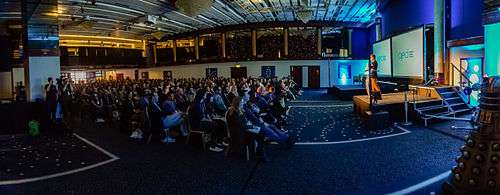
Ockham Awards
Background and procedure
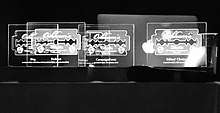
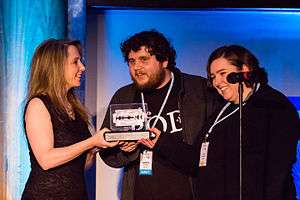
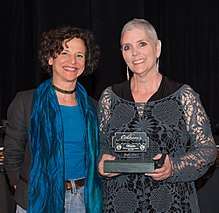
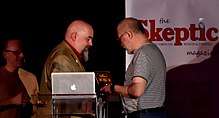
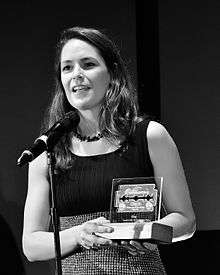
The Skeptic magazine annually awards the Ockham Awards, or simply the Ockhams, at QED. This occurred for the first time in 2012, and the award ceremony has been considered a highlight of the conference ever since.[2] The Ockhams were introduced by editor-in-chief Deborah Hyde to "recognise the effort and time that have gone into the community’s favourite skeptical blogs, skeptical podcasts, skeptical campaigns and outstanding contributors to the skeptical cause."[26]
The name refers to Ockham's razor, formulated by English philosopher William of Ockham (c. 1285–1347). The trophies, designed by Neil Davies and Karl Derrick, carry the upper text "Ockham's" and the lower text "The Skeptic. Shaving away unnecessary assumptions since 1285." Between the texts, there is an image of a double-edged safety razorblade, and both lower corners feature an image of William of Ockham's face.[26]
First, the skeptical community nominates the candidates for the Ockham Awards online, in the categories: blog, event / campaign, podcast, and video (until 2014). The most popular of these nominations comprise the shortlists. The shortlist winners are then contacted to provide a selection of their best work, and The Skeptic's panel of Judges makes the final decision from there.[27]
The ironic award 'for the most audacious pseudo-science', "The Rusty Razor" (introduced in 2017), is determined entirely by public vote.[28] "The Editors' Choice Award" is a special Ockham without a category, chosen by the current and past editors-in-chief of The Skeptic, Chris French, Wendy Grossman and Deborah Hyde.[27]
Winners
- Best Skeptic Blog
- 2012: SkepChick – Rebecca Watson et al.[26]
- 2013: The Quackometer – Andy Lewis[29]
- 2014: Leaving Fundamentalism – Jonny Scaramanga[25][30]
- 2015: Hayley is a Ghost – Hayley Stevens[31]
- 2016: Naturopathic Diaries – Britt Marie Hermes[2]
- 2017: Always Look on the Bright Side of Death – Crispian Jago[28]
- Best Skeptic Event / Campaign
- 2012: Robin Ince[26]
- 2013: Skeptics on the Fringe – Edinburgh Skeptics[29]
- 2014: The Nightingale Collaboration – Alan Henness & Maria MacLachlan[32]
- 2015: Stop the Saatchi Bill – Alan Henness & Andy Lewis[31]
- 2016: Good Thinking Society – Simon Singh et al.[2]
- 2017: Skeptics on the Fringe – Edinburgh Skeptics[28]
- Best Skeptic Podcast
- 2012: The Pod Delusion – James O'Malley & Liz Lutgendorff[26]
- 2013: The Token Skeptic – Kylie Sturgess[29]
- 2014: Skepticality – Derek Colanduno & Robynn "Swoopy" McCarthy et al.[30]
- 2015: The Godless Spellchecker – Stephen Knight[31]
- 2016: Say WHY To Drugs – Dr. Suzi Gage[2]
- 2017: The European Skeptics Podcast – András Pintér, Jelena Levin, Pontus Böckman[28]
- Best Skeptic Video
- 2012: "Storm" – Tim Minchin (skeptic video); "The Strange Powers of the Placebo Effect" – Daniel Keogh and Luke Harris (science video)[26]
- 2013: "Skepticism Advert" – Shut Up Infinity[29]
- 2014: "Superstition ain't the way" – Kylie Sturgess[30][33]
- For Skeptical Activism
- 2018: Michael Marshall[34]
- Editor's Choice
- 2012: Mike Hutchinson[26]
- 2013: The Pod Delusion[29]
- 2014: QED organisers[30]
- 2015: Mark Tilbrook[31]
- 2016: Crispian Jago[2]
- 2017: Edzard Ernst[28]
- The Rusty Razor
- 2017: Goop – Gwyneth Paltrow[4][35][36]
- 2018: Andrew Wakefield[34][37][38]
Notes
- Shortly after this photo was taken, it was discovered that there had been a mixup: Gerbic was handed the Best Video award instead of the Best Podcast award; they were subsequently switched. Jonny Scaramanga, too, accidentally received the 2014 Best Podcast Ockham for his "Leaving Fundamentalism" blog instead of the Best Blog award, which was soon corrected when discovered.[25]
References
- Girl on the Net (14 August 2013). "Sex with science nerds". The Guardian. Archived from the original on 30 March 2017. Retrieved 21 October 2017.
- Korteweg, Leon (2 December 2016). "QED 2016 – verslag van een lang weekend tussen skeptici". Skepter (in Dutch). Stichting Skepsis. 29 (4): 45–46. Archived from the original on 18 October 2017. Retrieved 21 October 2017.
- Alton Telegraph (13 October 2017). "SIUE's Hupp produces skeptical film premiering this weekend". The Telegraph. James Shrader. Archived from the original on 14 October 2017. Retrieved 21 October 2017.
- Jonathan O'Callaghan (16 October 2017). "The Worst Pseudoscience Of The Year Award Has Been Announced!". IFLScience. Elise Andrew. Archived from the original on 18 October 2017. Retrieved 18 October 2017.
- "Question, Explore, Discover". QED website main page. NWSE. Archived from the original on 20 April 2015. Retrieved 8 April 2015.
- "QED Announces Tickets and Speakers For 2012". MSS website. 29 August 2011. Archived from the original on 14 October 2017. Retrieved 8 April 2015.
- James O'Malley (6 February 2011). "1023 Overdose 2011 in Manchester (#ten23)". The Pod Delusion. YouTube. Archived from the original on 5 May 2016. Retrieved 22 October 2017.
- MSS (18 August 2010). "Announcing 'QED: Question. Explore. Discover.'". MSS website. Archived from the original on 21 June 2017. Retrieved 23 May 2013.
Greater Manchester Skeptics Society (18 August 2010). "QED: Question. Explore. Discover". Greater Manchester Skeptics Society website. Archived from the original on 19 July 2013. Retrieved 23 May 2013. - Hampshire Skeptics Society (Dave) (10 February 2011). "QED Con – Day 1". Hampshire Skeptics Society website. Archived from the original on 21 March 2016. Retrieved 24 May 2013.
Hampshire Skeptics Society (Dave) (11 February 2011). "QED Con – Day 2". Hampshire Skeptics Society website. Archived from the original on 5 February 2016. Retrieved 24 May 2013. - Sturgess, Kylie (4 May 2011). "The Little QEDCon That Can—Question, Explore, Discover In Manchester". Committee for Skeptical Inquiry website. Archived from the original on 8 July 2017. Retrieved 23 May 2013.
- "The 10:23 Challenge 2011". 10:23 Homeopathy – There's Nothing In It. Archived from the original on 22 July 2012. Retrieved 17 April 2015.
- Storr, Will (26 November 2011). "Little pill, big trouble". The Telegraph. Telegraph Media Group. Archived from the original on 8 April 2015. Retrieved 8 April 2015.
It will culminate in a mass international homeopathic overdose – a stunt that will seek to demonstrate that, as the campaign’s slogan has it, “there’s nothing in it”.
- Gerbic, Susan (23 March 2017). "Skeptic from Czech Republic Checks Out CSICon". Skeptical Inquirer. Committee for Skeptical Inquiry. Archived from the original on 28 August 2017. Retrieved 22 October 2017.
- "European Skeptics elect fresh leadership". European Council of Skeptical Organisations. 26 September 2017. Archived from the original on 26 September 2017. Retrieved 22 October 2017.
- "Truth detectives: the know-it-all skeptics railing against fakery?". The Guardian. Archived from the original on 4 February 2019. Retrieved 6 February 2019.
- "Meirion Jones: How to Make $100 Million with a Bogus Bomb Detector – QED 2016". QED. YouTube. 27 September 2017. Archived from the original on 11 November 2017. Retrieved 22 October 2017.
- Sturgess, Kylie (25 December 2013). "Episode One Hundred And Seventy Three – On Bad PR – Interview With Michael Marshall". Token Skeptic. Archived from the original on 22 July 2014. Retrieved 9 February 2014.
- "Event Schedule / QED 2017". QED website. NWSE. 13 October 2017. Archived from the original on 22 October 2017. Retrieved 22 October 2017.
- "QED Conference Channel". YouTube. QED. Archived from the original on 13 August 2017. Retrieved 20 October 2017.
- Wilson, Andy (29 February 2012). "QED: How to make a success of a conference for skeptics". Richard Dawkins Foundation for Reason and Science. Archived from the original on 21 January 2014. Retrieved 24 May 2013.
- Malburn, Chris (11 May 2013). "QED [Question, Explore, Discover]". The National Federation of Atheist, Humanist and Secular Student Societies (AHS) website. Archived from the original on 19 July 2013. Retrieved 24 May 2013.
- QED. "QED 2014 Schedule". QED website. North West Skeptical Events Ltd. Archived from the original on 14 July 2014. Retrieved 14 May 2014.
- "What's on at QED?". Archived from the original on 22 October 2017. Retrieved 21 February 2020.
- "Whatʼs on at QED?". Archived from the original on 3 December 2018. Retrieved 21 February 2020.
- Scaramanga, Jonny (22 April 2014). "On mind-controlling cults, Fred Phelps, and Ockham Awards". Leaving Fundamentalism. Patheos. Archived from the original on 23 October 2017. Retrieved 21 October 2017.
- Hyde, Deborah (2012). "The Skeptic Magazine Awards 2011: Winners". The Skeptic. 23 (4). Archived from the original on 23 October 2017.
- Hyde, Deborah. "The Ockham Awards". The Skeptic's website. Archived from the original on 23 October 2017. Retrieved 18 October 2017.
- "2017's Ockham Awards for Excellence in Skeptical Activism". The Skeptic. 14 October 2017. Archived from the original on 18 October 2017. Retrieved 21 October 2017.
- Hyde, Deborah (2013). "Who won the Ockham's?". The Skeptic. 24 (3).
- Colm (15 April 2014). "QEDCon 2014 – A Roundup". Sunny Spells. Archived from the original on 23 October 2017. Retrieved 18 October 2017.
- "The Ockhams 2015". The Skeptic. Archived from the original on 23 October 2017. Retrieved 21 October 2017.
- "More misleading claims at NHS Homeopathic Hospitals". The Nightingale Collaboration. 7 May 2014. Archived from the original on 7 April 2016. Retrieved 23 October 2017.
- "Superstition ain't the way: Kylie Sturgess at TEDxPerth". TEDx. October 2013. Archived from the original on 6 December 2014. Retrieved 14 May 2014.
- "The Ockhams 2018". www.skeptic.org.uk. The Skeptic Magazine. Archived from the original on 11 March 2020. Retrieved 11 March 2020.
- "Gwyneth Paltrow's Goop wins award for 'pseudoscientific nonsense'". The Age. 18 October 2017. Archived from the original on 18 October 2017. Retrieved 18 October 2017.
- Gunderman, Dan (16 October 2017). "Gwyneth Paltrow-led wellness brand Goop earns 'Rusty Razor' award for 'worst pseudoscience'". New York Daily News. Archived from the original on 17 October 2017. Retrieved 18 October 2017.
- Hale, Tom. "This Year's Award For The Worst Pseudoscience Is Especially Deserved". www.iflscience.com. IFLScience. Archived from the original on 11 March 2020. Retrieved 11 March 2020.
- Pritchard, Tom. "This Year's 'Worst Pseudoscience Award' Goes to Anti-Vax Fraud Andrew Wakefield". www.gizmodo.co.uk. Gizmodo. Archived from the original on 11 March 2020. Retrieved 11 March 2020.
External links
| Wikimedia Commons has media related to QED conference. |